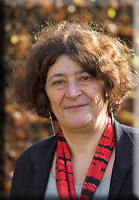 |
Heather Dale Counselling and Psychotherapy in Keighley, West Yorkshire & Online |
 |
| 14th July 2025 | ||||||||||||||||
|
 Heather Dale, Counselling, Psychotherapy and Clinical Supervision in Keighley and West Yorkshire and elsewhere.Welcome to my website.Hello, If you are looking at these pages, the chances are that you are in a challenging period of your life and need some help. Hopefully I can offer that., within a seccure and confidential space. I work from my counselling room at home, situated between Bingley and Keighley in West Yorkshire.You will already have seen that my name is Heather, but what you may not know is that I’ve had the privilege of being a therapist for over 40 years, supporting people through all kinds of different challenges in their life. I am also trained (as a therapist) to offer emotinional support to individuals—and their families or friends—who are adjusting to a newly-diagnosed visual impairment. Additionally, I am happy to work with anyone living with visual impairment who may be facing other challenges, offering a compassionate space to address both the emotional and practical aspects of their experiences. Later on in these pages, you can listen to a podcast I made earlier in the year, or even have a look at my publications. . What I Offer I provide both long-term and short-term therapy. Long-term therapy (lasting a year or more) is great for deep-rooted issues, while short-term therapy can be very helpful if you’re dealing with sudden changes in your life. The choice is always yours, though I often suggest six sessions to start, then we can review and see how you’re feeling. I am happy to work with any issues you might bring, including issues to do with all kinds of relationship, such as family, work or friendships. On these pages, I’ll give you an idea of how therapy works and how I can support you, both on-line or face to face from my room near Bingley. If you have any questions, please don’t hesitate to reach out. You’ll also find my contract here, which might answer some of your queries. Here’s a little of what you can expect from our work together: Some of What I Can Offer: • A safe, welcoming space where you can explore both past and present challenges, and share your thoughts and feelings in a supportive environment. • An opportunity to gain new perspectives and truly understand your unique self. • Time to reflect on how past experiences may be influencing your life today. • A chance to identify unhelpful patterns and consider changes you might want to make. Who I Work With I work with individuals who are seeking therapy, as well as trainees and experienced therapists (both online and in person). If we’re connecting online or by phone, please make sure you’re in a private, quiet space so our conversation remains confidential. I also encourage taking some time before and after our sessions to reflect on what you’d like to discuss, and what we’ve talked about. While this isn’t essential, it can really enhance the process. I still offer in-person sessions, especially for supervision, so please reach out if that’s something that feels right for you. The beauty of online therapy is that you can meet with me from the comfort of your home—or even from a peaceful garden or quiet spot. No travel time means more flexibility, making it easier to fit sessions into your life. If you’re unsure, why not give it a try? Please note: because my therapy room is up a flight of stairs, it is not accessible for wheel chair users - sorry!. My Approach to Therapy I provide what is broadly known as "talking therapy" which is also sometimes called psychotherapy. That means that through listening closely to what you tell me I may offer new insights or perspectives that help with mental and emotional issues, such as stress ( from whaever reason) and depression. Counselling vs. Psychotherapy You might be wondering about the difference between counselling and psychotherapy. While the terms can vary in meaning, I use them interchangeably. Both aim to help people gain insights and make positive changes. Traditionally, counselling focuses on current issues, while psychotherapy dives deeper into past experiences. But in practice, these lines often blur. I am a senior, accredited therapist registered with the BACP, and I’m also proud to hold a Fellowship for my contributions to professional ethics. If you'd like to know more about BACP’s ethical framework, or read my contract with important details about confidentiality, please check the resources on my website. What Happens Next? Our journey together will typically begin with a quick phone call to discuss what you’re looking for in therapy. From there, we can schedule your first session, and I’ll send over my contract and other details before we meet. This first session is a chance to see if we’re a good fit for each other. If we decide to move forward, therapy can be an open-ended process, with no set end date. I’m looking forward to hearing from you and hopefully starting this journey together. |
|||||||||||||||
| ©2025 Heather Dale — powered by WebHealer Website Cookies Privacy Policy Admin Login |